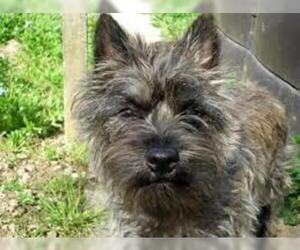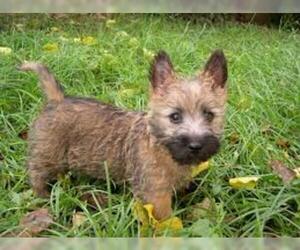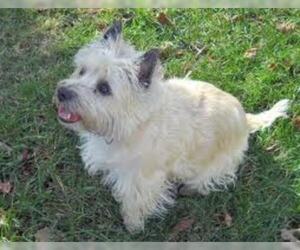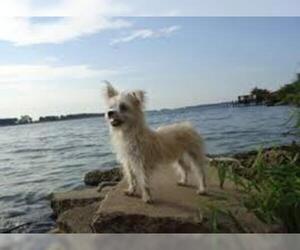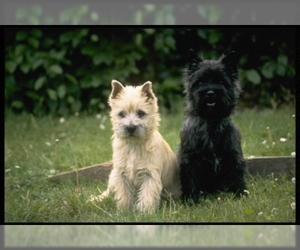
All about Cairn Terrier dog breed
A.K.A. :Short-haired Skye Terrier, Little Skye, Prick-Eared Skye Terrier, Dwarf Skye, Cairn, Cairns, Cairns Terrier
Size
Grooming requirements
Exercise requirements
Good with other dogs
Watchdog ability
Energetic
Training requirements
Playful
Affectionate
Good with other pets
Good with children
Good with strangers
Winter
Summer
Healthiness
Protective
Life Span
| Pure Breeds | Member |
| Breeds A - Z | C |
| Breeds by Group | Terrier |
| Breeds by Trait | Hypoallergenic Low Shedding |
| Overview: | The Cairn Terrier, originating from the Scottish Highlands, is a small yet sturdy and spirited dog, famously recognized for its role as "Toto" in The Wizard of Oz. Physically, they boast a shaggy, weatherproof double coat, typically in colors like cream, wheaten, red, sandy, brindle, or gray, along with distinctive prick ears and a short, perky tail. Known for their confident, curious, and intelligent temperament, Cairns are lively companions who thrive on interaction and mental stimulation. They are generally good with children and can adapt well to apartment living provided they receive adequate daily exercise and playtime, as their inquisitive nature requires engagement. While typically a robust breed, potential health concerns can include luxating patella, various eye conditions, and certain skin allergies, making regular veterinary check-ups important for their long-term well-being. |
F.A.Q.
All You Need to Know About the Cairn Terrier Breed
The Cairn Terrier, originating from the Scottish Highlands, is a small yet sturdy and spunky breed known for its endearing charm. These intelligent and fearless dogs possess a playful, affectionate temperament, making them wonderful companions for active individuals and families alike. Their distinctive shaggy, wiry coat comes in various colors and requires moderate grooming – regular brushing to prevent matting and occasional professional stripping or hand-stripping to maintain coat health. Cairns are adaptable and can thrive in apartments provided they receive adequate daily exercise, including walks and playtime, to satisfy their energetic nature. While generally healthy, potential owners should be aware of common breed-specific health concerns like luxating patella and various eye conditions. If you're seeking a loyal, spirited, and relatively low-maintenance companion, the Cairn Terrier might be your perfect match.The average weight for a Cairn Terrier is 13-14 pounds. Adult Cairn Terriers typically fall within a healthy weight range of 13 to 14 pounds. While there isn't a significant weight difference between males and females, slight variations can occur. This makes them a compact and manageable companion. Always ensure your Cairn Terrier maintains a healthy weight to prevent health issues.
Curious about how tall a Cairn Terrier gets? Here's what you need to know about the average height of this charming breed:
The average height of a Cairn Terrier typically ranges from 9.5 to 10 inches tall at the shoulder for a mature adult. While there isn't a significant difference in height between males and females, males may sometimes be at the upper end of this range, and females at the lower. This measurement is taken from the ground to the top of the dog's shoulder blades (the highest point of the back, not the head).So, if you're wondering "how tall is a Cairn Terrier?" you can expect a sturdy, compact dog usually under a foot in height! Keep in mind that individual genetics can lead to slight variations, so some Cairns might be a little shorter or taller than this average size. This makes them a perfect small-to-medium companion suitable for various living situations.Cairn Terrier colors come in a wide variety, though not all are officially recognized. The AKC recognized Cairn Terrier colors include brindle (often dark, grey, red, or silver), cream, fawn, red, sandy, and black. These accepted shades can vary in intensity and often have darker points or markings.For those interested in rare coat types and exotic Cairn Terrier variations, colors like wheaten, grey, and parti (while not standard) occasionally appear. It's important to note that blue, lilac, merle, or chocolate are not natural Cairn Terrier colors and indicate a mixed breed or an unregistered lineage. These "designer" colors are not accepted by major kennel clubs like the AKC and prospective buyers should be wary of breeders claiming such colors are purebred or command higher pricing. Focus on the traditional, healthy, and AKC recognized Cairn Terrier colors when seeking a reputable breeder.
The Cairn Terrier personality is characterized by a bold, independent, and curious nature. These charming dogs are known for their loyal and affectionate temperament towards their families, often displaying a playful and spirited demeanor. While generally friendly and sociable with people they know, their terrier instincts mean they can be reserved with strangers initially, though rarely aggressive.Cairns are adaptable to apartment living provided they receive adequate daily exercise and mental stimulation. They thrive on human companionship and are not content to be left alone for long periods. With children, Cairn Terriers are typically good-natured and tolerant, making them excellent family pets, especially when raised together. However, supervision is always recommended, particularly with very young children. Regarding other pets, due to their strong prey drive, Cairn Terriers may chase smaller animals like cats or rodents, though many can live harmoniously with felines if introduced properly and raised together. They can also get along well with other dogs, especially those of a similar size and energy level. The temperament of Cairn Terrier is intelligent and eager to please, making them trainable, but their independent streak requires consistent and positive reinforcement.
The Cairn Terrier temperament is generally described as affectionate, lively, and intelligent, making them excellent companion dogs. They are known for their fearless and curious nature, always ready for an adventure.Friendliness & Sociability: Cairns are typically friendly and outgoing with their families and often sociable with strangers once they've had a proper introduction. Early socialization is key to ensuring they grow into well-adjusted adults.Loyalty: They are fiercely loyal to their owners, forming strong bonds and thriving on being part of the family's daily activities. This loyalty can sometimes manifest as a protective instinct.Adaptability to Apartment Living: While active, their relatively small size makes them adaptable to apartment living as long as they receive adequate daily exercise and mental stimulation. Regular walks and playtime are essential to prevent boredom and destructive behaviors.Behavior with Children: Cairns can be wonderful with children who are taught how to respectfully interact with dogs. Due to their playful nature, they often enjoy games and companionship with older, more considerate children. Supervision is always recommended with very young children.Behavior with Other Pets: With proper early socialization, Cairns can coexist peacefully with other dogs. However, due to their strong prey drive (bred to hunt small rodents), they may not be suitable for homes with smaller pets like hamsters, guinea pigs, or cats, unless introduced carefully and supervised from a very young age.Stubbornness & Sensitivity: They possess a typical terrier stubbornness, meaning training requires patience, consistency, and positive reinforcement. They are not overly sensitive but respond best to gentle, firm guidance rather than harsh corrections. Their intelligence means they learn quickly, but their independent spirit means they might test boundaries.
Cairn Terrier Care: Daily Maintenance & Health TipsCaring for a Cairn Terrier involves understanding their specific needs for a happy, healthy life. Cairn Terrier care is relatively straightforward, making them a good choice for many households.Grooming Needs: Despite their scruffy appearance, Cairn Terriers are not high-maintenance groomers. They possess a wiry double coat that sheds minimally. Regular brushing, at least 2-3 times a week, is essential to prevent matting and remove loose hair and dirt. Hand-stripping every few months is recommended to maintain coat texture and color, but professional grooming every 6-8 weeks is also an option. Occasional baths, as needed, are sufficient.Exercise Limitations: Cairn Terriers are a surprisingly low-energy dog breed for their size, but they still require daily exercise to prevent boredom and maintain a healthy weight. Aim for 30-60 minutes of moderate activity, such as walks, playtime in a secure yard, or short games of fetch. They are highly intelligent and enjoy mental stimulation, so puzzle toys and training sessions are beneficial. While they have good stamina, they are not suited for extremely long runs or intense athletic activities.Dietary Considerations: Feed your Cairn Terrier a high-quality dog food appropriate for their age, size, and activity level. Portion control is crucial as they are prone to weight gain. Avoid free-feeding and follow the manufacturer's guidelines, adjusting as needed based on your dog's individual metabolism. Healthy treats in moderation are fine, but ensure they don't contribute to excessive calorie intake.Wrinkle and Ear Cleaning: Cairn Terriers do not have prominent wrinkles, so specific wrinkle cleaning is not typically required. However, regular ear checks and cleaning are important to prevent infections. Clean their ears weekly or bi-weekly with a vet-approved cleaner and cotton balls, ensuring they are dry afterward.Climate Sensitivity (Not Brachycephalic): It's important to clarify that Cairn Terriers are NOT a brachycephalic breed (short-nosed). Therefore, they do not have the same extreme climate sensitivities as breeds like Pugs or Bulldogs. However, like all dogs, they can overheat in very hot weather and are susceptible to frostbite in extreme cold. Always provide shade and water in warm weather and ensure they are protected from the elements in winter.Common Health Concerns: Regular veterinary check-ups are vital for early detection and prevention of common health tips for Cairn Terrier. Key areas to monitor include:* Skin Issues: They can be prone to allergies, leading to itchy skin and hot spots.* Dental Care: Daily brushing is highly recommended to prevent plaque buildup, tartar, and gum disease. Professional dental cleanings may be necessary.* Weight Management: As mentioned, they are prone to obesity, which can exacerbate other health problems.* Patellar Luxation: A common orthopedic issue in small breeds.* Legg-Calvé-Perthes Disease: A condition affecting the hip joint.* Globoid Cell Leukodystrophy (GCL): A neurological condition that can be screened for.By understanding how to care for a Cairn Terrier, potential owners can provide a loving and responsible home for these charming, spirited dogs.
The Cairn Terrier activity level is moderately high. These spirited dogs require consistent daily exercise to stay happy and well-behaved. Typically, they need at least 30-60 minutes of active Cairn Terrier exercise needs per day, which can be broken into several shorter sessions.How active are Cairn Terrier? They are known for their bursts of energy followed by periods of restful downtime. They love to play, especially engaging in games of fetch, chasing toys, and exploring secure yards. Regular walks, playtime in a fenced area, or even agility training are excellent ways to meet their physical and mental stimulation needs.It's important to note that while energetic, Cairn Terriers are not overly athletic in the endurance sense. Their brachycephalic (short-nosed) anatomy means they can be prone to overheating, especially in warm weather or during intense, prolonged activity. Therefore, exercise should be monitored and limited during hot conditions to prevent respiratory distress.Cairn Terriers strike a good balance, making them suitable for both active families who enjoy regular outdoor activities and those with a more moderate lifestyle, provided their daily Cairn Terrier exercise needs are consistently met. They are not typically suitable for extremely low-energy households unless dedicated time is set aside for their specific activity requirements. Mental stimulation through puzzle toys and training is also crucial to prevent boredom.
Breed Breakdown: What Experts Say About the Cairn Terrier
I would rate the "Size" trait of the Cairn Terrier a 3 out of 10.Cairn Terriers are undeniably a small breed. They typically stand between 9.5 and 10 inches tall at the shoulder and weigh around 13 to 14 pounds. Their body structure is sturdy and compact, but still very much on the smaller side. When compared to other companion dogs, they are considerably smaller than breeds like Labradors or Golden Retrievers, and even smaller than medium-sized dogs such as Beagles. They are more in line with breeds like the Scottish Terrier or Norwich Terrier in terms of size, though often a touch smaller. Their diminutive stature makes them exceptionally well-suited for apartment living, frequent travel (fitting comfortably in airline carriers or car seats), and households with limited space. They are not delicate, but their small footprint is a defining characteristic.
I would rate the grooming requirements of the Cairn Terrier at a 7. While they aren't the most demanding breed, they are definitely not low-maintenance. Their double coat, consisting of a wiry outer layer and a soft undercoat, requires regular attention to prevent matting and maintain its protective qualities. Weekly brushing is essential to remove loose hair and dirt, and professional hand-stripping every few months is highly recommended to preserve the coat's texture and color, and to ensure proper shedding. Simply clipping the coat can soften it and compromise its natural weather resistance. They are moderate to low shedder if groomed correctly. Ear cleaning should be done regularly to prevent infections, and nail trimming is needed every few weeks. While generally healthy, like many breeds, they can be susceptible to some skin allergies, which might necessitate specialized shampoos or dietary considerations, adding to the grooming routine. Compared to a short-haired breed, a Cairn Terrier definitely requires frequent and somewhat specialized grooming to keep them looking their best and feeling comfortable.
I would rate the Cairn Terrier's exercise requirements at a 7 out of 10.While not in the extreme endurance category, Cairns are surprisingly energetic and robust for their size, definitely not a "couch potato" breed. They were bred to hunt and kill vermin, a job that required quick bursts of speed, agility, and stamina. A daily walk of at least 30-45 minutes is a minimum, and they truly thrive with more, including opportunities to run, explore, and play. Their terrier nature means they are intelligent and need mental stimulation alongside physical activity; otherwise, boredom can lead to destructive behaviors. They love interactive playtime, chasing toys, and are often excellent at dog sports like agility, earthdog trials, or even flyball, showcasing their quickness and problem-solving skills. Unlike brachycephalic breeds, Cairns have no inherent respiratory limitations due to their head structure, allowing them to engage in sustained movement without significant concern, though common sense regarding hot weather always applies. They are not a breed that thrives with minimal activity; rather, they require structured routines and varied activities to stay healthy, well-behaved, and mentally stimulated, preventing them from becoming anxious or overweight.
I'd rate the Cairn Terrier's "Watchdog Ability" at a strong 8 out of 10. They are incredibly alert and possess keen senses, making them quick to notice anything out of the ordinary, be it an unfamiliar sound or a person approaching their territory. Their barking behavior is a key factor; they are not typically nuisance barkers, but they will vocally announce an arrival or perceived threat with enthusiastic and persistent barks, providing meaningful early warnings. Cairns have a surprisingly strong territorial instinct for their size and are not shy about standing their ground, often surprising strangers with their confident demeanor. While they aren't guard dogs in the sense of physically attacking an intruder, their persistent barking and unwavering focus on the perceived threat are highly effective deterrents. They are far from passive companions in this regard and excel at providing a reliable "alarm system" for the home environment.
I would rate the "Good with Other Dogs" trait of the Cairn Terrier at a 6 out of 10.While Cairns are generally sturdy, intelligent, and can certainly be accepting of other dogs, especially when properly socialized from a young age, they aren't inherently "extremely sociable" in the way some retriever or many toy breeds might be. Their terrier heritage imbues them with a strong prey drive and a confident, sometimes feisty, personality. This means that while they aren't typically outright aggressive towards other dogs, they are often not pushovers and may stand their ground if challenged. They can thrive in multi-dog households, particularly when raised with other dogs or if the other dogs have a compatible temperament. However, careful introductions are crucial, especially with unfamiliar dogs, as they can sometimes be assertive or even dominant if they perceive another dog as encroaching on their space or resources. Their energy levels can vary, but they generally appreciate a good play session. They might not always be the first to initiate play with an unfamiliar dog, and their reaction can depend heavily on the other dog's demeanor. With proper socialization and training, they can coexist peacefully and even form strong bonds, but without it, or in situations with very high-strung or aggressive dogs, their terrier tenacity can surface, requiring careful management.
The Cairn Terrier, despite its small stature, possesses a surprisingly robust and "Energetic" trait, earning a rating of 8 out of 10.Cairns are naturally active and spirited dogs, far from laid-back. Their terrier lineage instilled in them a high drive for exploration, hunting (even if it's just a squeaky toy), and constant engagement. They have excellent endurance for their size, capable of sustained play sessions and long walks without tiring easily. Their playfulness is a hallmark of the breed; they thrive on interactive games, chasing, and digging, and they demand a good amount of physical and mental stimulation to prevent boredom and destructive behaviors. They are well-suited for a variety of outdoor and athletic activities, enjoying hiking, agility, and earthdog trials.It's important to note that while some brachycephalic breeds suffer from significant exercise limitations, the Cairn Terrier is not typically considered brachycephalic in the same way as, for example, a Bulldog or Pug. Their muzzle, while relatively short, is proportionate to their skull and generally does not cause the severe respiratory issues that affect true brachycephalic breeds. Consequently, their stamina and exercise tolerance are generally very good for their size, with no significant impairment due to their head structure, allowing them to fully embrace their energetic nature.
I'd rate the Training Requirements of the Cairn Terrier at a 7 out of 10.While intelligent, Cairns are classic terriers: they possess a strong independent streak and a formidable will. Their attention span can be short, especially if something more interesting (like a squirrel) is present, and their stubbornness means they often choose to obey only if they see a benefit or if the training is made consistently engaging. They are responsive to commands when they understand the expectation and trust their handler, but they will test boundaries relentlessly. This breed absolutely requires a high degree of consistency and patience from their owner. Positive reinforcement is highly effective, as they thrive on praise and treats, but it needs to be delivered promptly and enthusiastically. They are not particularly beginner-friendly; a first-time dog owner might find their independent nature and tendency to "negotiate" commands frustrating without prior experience in establishing clear leadership and structured routines. They benefit immensely from early socialization and consistent, fun, short training sessions throughout their lives to prevent unwanted behaviors and channel their energetic, intelligent minds.
I would rate the Cairn Terrier's "Playful" trait an 8 out of 10.Cairn Terriers are naturally spirited and possess a good deal of energy for their size, definitely not laid-back compared to many other companion dogs. They absolutely adore games and interaction, often initiating play with their owners. Their love for toys is undeniable, and they respond with great enthusiasm to playtime, whether it's a vigorous tug-of-war or a simple game of fetch. While not excessively attention-seeking in an annoying way, they thrive on being involved in family activities and will certainly let you know when they're ready for some fun. Their overall enthusiasm in daily life is infectious; they approach most situations with a curious and lively demeanor. They are always up for an adventure, even if that adventure is just in the backyard, making them wonderfully fun-loving companions.
I would rate the "Affectionate" trait of the Cairn Terrier a 7 out of 10.Cairn Terriers are genuinely loving and people-oriented dogs, displaying a clear desire for human companionship. They are known for their loyalty to their families, often following their owners from room to room, enjoying being part of the the household's activities. While they appreciate physical closeness and will readily accept cuddles and lap-sitting, especially after a good play session, they aren't typically as intensely "velcro" as some other companion breeds. They also exhibit a surprising sensitivity to their owner's emotions, often offering comfort in subtle ways. However, their independent terrier spirit means they also enjoy their own space and don't always demand constant physical attention. They thrive on affection and being included, but have an admirable balance between devotion and self-reliance, making them less prone to separation anxiety than some breeds that are rated higher in constant physical need.
I would rate the "Good with Other Pets" trait of the Cairn Terrier at a 6 out of 10.Cairn Terriers are generally good-natured and can certainly coexist peacefully with other pets, but they aren't inherently the most "pet-friendly" breed without some mindful management. Their terrier heritage imbues them with a significant prey drive, which means smaller, fast-moving animals like cats (and even some small dogs) can trigger their instinct to chase. While they typically get along well with other dogs, especially those of a similar size and play style, resource guarding can be a concern if not addressed through early training and consistent management, particularly around food and favorite toys. Socialization from a young age is crucial for a Cairn to learn appropriate behavior around other animals, and even then, supervision is often required, especially with cats or pocket pets. They can adapt to multi-pet households, but it's more about careful integration and ongoing training to mitigate their natural instincts rather than a purely natural sociability with all creatures.
Rating: 6Cairn Terriers can be good with children, but they aren't inherently the most child-friendly breed, landing them a respectable but not top-tier score. Their temperament is generally spirited, playful, and affectionate with their own family, and they do enjoy being involved in activities. They can be quite tolerant of noise and the boisterous energy of older children, and their sturdy build means they're less fragile than some toy breeds. However, their terrier nature means they have a strong prey drive and a sometimes independent streak. They can be prone to nipping or snapping if startled, handled roughly, or pushed beyond their patience, especially with very young children who haven't learned proper dog etiquette. They thrive in a family setting where children are taught how to interact respectfully with a dog, and where the Cairn receives consistent training and socialization from a young age. Supervision is definitely key with toddlers and preschoolers. They are not naturally gentle to the extent of a Golden Retriever, but with proper guidance for both dog and child, they can be a loving and fun companion for families with slightly older, more considerate children.
The Cairn Terrier rates a 7 on the "Good with Strangers" scale. They are generally quite sociable and curious, rather than overtly reserved or aggressive. A well-socialized Cairn will typically greet new people with a wagging tail and an eagerness to investigate, often offering a friendly sniff or even a lick. They aren't usually guard dogs in the sense of being aggressive, but their terrier nature means they will alert you with barks if someone approaches. They are adaptable in public, enjoying new sights and smells, and tend to be comfortable in guest-filled environments once they've assessed the situation. While naturally outgoing, early and consistent socialization is key to ensuring their natural friendliness is channeled into polite curiosity rather than overly boisterous greetings or excessive barking at every new face. They aren't typically aloof, but they also aren't usually the type to instantly melt into the lap of every stranger they meet without a moment of assessment.
The Cairn Terrier rates a 7 for winter tolerance.Cairn Terriers possess a double coat, which is a significant asset in cold weather. Their harsh outer coat is weather-resistant, while the soft, dense undercoat provides insulation. This natural design helps them shed water and trap warm air close to their bodies. Being a smaller breed, they do lose heat more quickly than larger dogs, and their relatively low body fat compared to some larger, bulkier breeds offers less internal insulation. However, they are not brachycephalic, so they don't have the respiratory challenges that can exacerbate cold sensitivity in breeds with shortened snouts. While generally robust, their small size does increase their risk of hypothermia if exposed to extreme cold for prolonged periods without adequate shelter or activity. They are energetic and enjoy outdoor activity, which generates body heat, but their paws are still susceptible to frostbite and irritation from ice melt chemicals.Compared to many companion dogs, Cairn Terriers are relatively well-equipped for winter, but they are not impervious. They typically don't require extensive special care in moderate winter conditions, but in very cold or icy climates, a winter coat or sweater would be beneficial for longer outings, especially for older or less active individuals. Paw protection (booties) is also recommended to prevent injury and chemical exposure. They should always have a warm, dry place to retreat to and their outdoor time should be monitored, especially when temperatures drop significantly below freezing.
I'd rate the "Summer" tolerance of the Cairn Terrier breed as a 6.Cairn Terriers are not brachycephalic, which is a significant advantage in heat tolerance compared to breeds like Pugs or Bulldogs. This allows them to breathe more efficiently and regulate their body temperature better. However, they possess a dense double coat that, while offering some insulation, can also trap heat during very hot weather. Their generally active and inquisitive nature means they might overexert themselves if not monitored. While not extremely sensitive, they are not immune to heatstroke, especially during peak afternoon heat or with strenuous activity. They can enjoy outdoor activities in the summer, but their exercise should be moved to cooler parts of the day (early morning or late evening), and access to shade and fresh water is essential. Compared to many other companion dogs, particularly those with shorter coats or less energy, Cairns do require a bit more special care in summer. They don't typically need constant air conditioning like some more sensitive breeds, but they will benefit from a cool indoor environment during the hottest parts of the day, and owners should be vigilant about signs of overheating during outdoor excursions.
I would rate the Cairn Terrier's "Healthiness" trait as an 8 out of 10.Cairn Terriers are generally considered a robust and healthy breed with a good life expectancy, often reaching 12-15 years or even more. They are not typically prone to the severe breathing difficulties or debilitating joint problems seen in some other breeds. While they do have some genetic predispositions, such as patellar luxation, globoid cell leukodystrophy (GCL), and some eye conditions like ocular melanosis, responsible breeding practices significantly minimize the prevalence and impact of these issues. Skin conditions can occasionally occur, but are not exceptionally common or severe. Compared to many other companion dogs, they are not high-maintenance in terms of health and are generally quite hardy. Preventive care and regular veterinary check-ups play a crucial role, as with any breed, in maintaining their excellent health.
I would rate the "Protective" trait of the Cairn Terrier at a 7 out of 10.Cairn Terriers are inherently alert and possess strong territorial instincts, stemming from their original purpose as vermin hunters. They are exceptionally loyal to their owners and will readily bark to signal the presence of strangers or unusual activity. This makes them excellent watchdogs, as they are quick to announce anything out of the ordinary. However, their small size and generally friendly demeanor mean they are more likely to deter an intruder through their persistent barking and bold, feisty attitude rather than through physical confrontation. While they are courageous and won't back down easily, they are fundamentally a companion dog, and their "protection" comes primarily from their alerting capabilities rather than their capacity to offer meaningful physical guard dog services in a household setting. They'll let you know something's wrong, but they're not built to be a strong physical deterrent.
I would rate the "Life Span" trait of the Cairn Terrier a 9.Cairn Terriers are widely considered a long-lived breed, often surpassing the average lifespan of many other small to medium-sized companion dogs. Their typical life expectancy ranges from 12 to 15 years, with many individuals living even longer, sometimes into their late teens. While they are not entirely free from health concerns, they are generally a robust breed with fewer widespread, severe genetic predispositions compared to some other breeds. Responsible breeding practices further help to minimize the incidence of conditions like patellar luxation, globoid cell leukodystrophy, and certain eye conditions, which are manageable or relatively rare in well-bred lines. With proper nutrition, regular veterinary care, and an active lifestyle, Cairn Terriers tend to enjoy excellent health throughout a significant portion of their lives, making them an excellent choice for owners seeking a long-term companion.
Cairn Terrier Puppies for saleSee all puppies for sale
Cairn Terrier Dogs for adoptionSee all dogs for adoption
Cairn Terrier BreedersSee all breeders
Similar Dog Breeds for Cairn Terrier
Breed Mixes of Cairn Terrier
Quick Breed Selector 0 - not important, 1 - smallest, 10 - largest
Variants & Mistakes :Cairn Terrer, Cairn Terrior, Cairn Terreir, Cairn Terrierre, Cairn Terriar, Cairn Terrierr, Cairn Terriour, Cairn Terrir, Cairn Terror, Cairn Teria, Cairn Terier, Cairn Terryer, Cairn Terryor, Cairn Teirrer, Cairn Tarrer, Cairn Tairn Terrier, Cairn Taiern Terrier, Cairn Cairn Terrier, Cairne Terrier, Cairn Terriew, Carn Terrier, Caren Terrier, Kern Terrier, Cairn Tierreir, Cairn Terirer, Caine Terrier, Cairin Terrier, Ceirn Terrier, Kairn Terrier, Cayrn Terrier, Cairn Tarrirer
